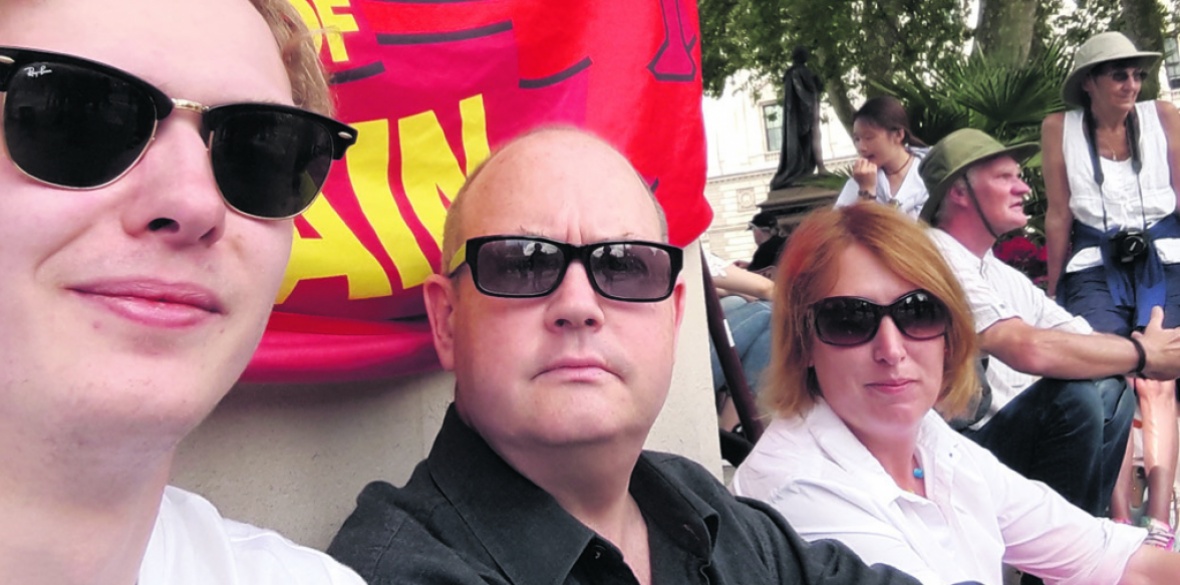This is the last article you can read this month
You can read more article this month
You can read more articles this month
Sorry your limit is up for this month
Reset on:
Please help support the Morning Star by subscribing here
THE recent death of Mark O’Neill, who among many roles in the movement was the Communist Party’s Anti-Austerity Commission convener, has come as a great blow to his party comrades and to the many labour movement activists who knew him and his unrelenting work in the movement.
Mark was also a respected member of the party’s executive until his battle with cancer made it impossible for him to continue.
When I learned of his death from his partner, great love and comrade, Deirdre, my mind went back to a teachers’ tour of Cuba we organised together in 2011 — a tour which I think and hope illustrates important aspects of Mark’s strong communist character and contribution to the working-class movement.
First, it illustrated his internationalism — never for Mark just a slogan or “add-on”but a living central issue inseparable from the day-to-day struggle in Britain.
The march through Havana on the 50th anniversary of the Bay of Pigs victory over the US-backed invasion was just one moment in Mark’s commitment to that struggle for socialism — a struggle which long preceded it and then followed it.
From early morning and for most of the day in April 2011 we marched, but Mark and Deirdre and their sons, Daragh and Cormac, both themselves now movement activists, were keen to go on into the early hours of the next morning, encouraging us to go on visiting neighbourhoods and Committees for the Defence of the Revolution to deliver our message of solidarity.
Back home in Britain, Mark was always committed to promoting such solidarity work, mainly through the teachers’ unions.
The Cuba tour also underlined his lifelong commitment to education and to helping young people develop the powers of understanding, analysis, self-expression and organisation that are essential in the daily struggle, and equipping them to contribute to the fight for a better world. And he loved Cuba for that — just as he loved the teaching profession here.
He started work in the “informal education” world of developing and managing children’s adventure playground activities for inner-city kids, designed to promote values of co-operation rather than competition — most of the time! — and mutual support rather than survival of the fittest.
Mark continued with that educational philosophy throughout his career as a teacher and into his much-admired role as head teacher in Yorkshire and Lancashire.
But such values brought him and his staff into direct contradiction and conflict with the government’s elitest and oppressive Ofsted school inspection and ranking regime — and despite Mark leading a strong fight against its setting school against school and pitting teacher against teacher, Ofsted with its state backing finally won the day, and he had to take up the fight elsewhere in education, as did many other fine educators.
Thinking back to that Cuba trip, I also clearly remember Mark’s organisational and practical leadership qualities — and his ability to analyse and explain simply and clearly what issues were priorities, and which were secondary contradictions that should not throw us off track.
We arrived at Jose Marti airport to be met by a warm welcome from representatives of the SNTECD education union, who had promised the 12 teachers on the solidarity tour visits to a range of schools and colleges over five or six days.
As part of the welcome, though, they shared with us the news that all the schools would be closed during our visit due to the Bay of Pigs 50th anniversary commemorations and celebrations and a subsequent schools holiday.
Not surprisingly this caused a fair bit of consternation and friction among our colleagues — but Mark with his always calm and unruffled style simply put the question to them: “What greater time to be in Cuba, and what greater privilege could there be than to play a full part in the anniversary activities, and to offer to take solidarity messages to as many trade union meetings and CDR community centres, and to Cuban kids in holiday activity centres etc as possible?”
Our small contradiction with the tour timetable, he said, was nothing compared with Cuba’s contradiction with imperialism — so let’s get on with our welcome and unexpected role in that!
Just one short week in Cuba illustrated Mark’s strong and sustained contribution to the struggle in Britain — a contribution which extended way beyond his career in education and the education unions, to leadership work in his trade union council (he was chair of Halifax and Calder Valley Trades Council), Unison (chair of his local branch) and Unite Community and locally and nationally in the People’s Assembly, which he regarded as essential to the anti-austerity struggle and developing the mass movement in the unions and communities — work which continued right up to the point the struggle against cancer was finally too much.
Mark was a fine Communist Party member, always thinking and working to strengthen the party in terms of its membership, its internal organisation, its education programmes and its role in the labour and mass progressive movement.
Everybody who worked alongside him, and many others too, will miss him greatly. We hope those in the party — and those not yet members — will think carefully about how they can now help to fill the gap he has left.
Our thoughts are with Deirdre, Daragh and Cormac in their devastating loss, and of course also with all those who, like me, will forever miss such a fine comrade and loved mate.
Bill Greenshields is former chairman of the Communist Party of Britain.










